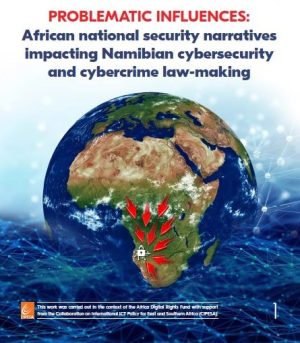States have a legitimate mandate to protect national security. However, on a global scale, the concept of national security has increasingly become a problematic framework for state approaches to cyberspace and digital technology law. In many countries, the state frequently invokes the rhetoric of national security to justify authoritarian repression and human rights violations. In the context of cyberspace and digital technologies, these repressive actions and violations are often carried out through cybersecurity and cybercrime-related laws and enforcement mechanisms.
This short briefing paper examines the national security narratives currently being applied to the framing of cybersecurity and cybercrime laws in Africa and to some extent in Namibia. The paper is published in partnership with CIPESA (the Collaboration on International ICT Policy for East and Southern Africa).

